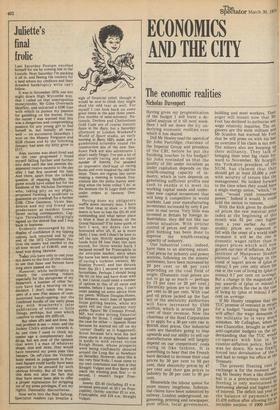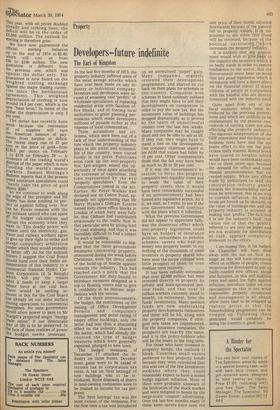The economic realities
Nicholas Davenport
Having given my prognostication of the budget I will leave a detailed analysis of it till next week. Here I will set down the icy underlying economic realities over which it has skated.
Did Mr Healey read the speech of Sir John Partridge, chairman of the Imperial Group and president of the CBI, before he put the finishing touches to his budget? Sir John reminded us that the quality of life under socialism as under capitalism depends on the wealth-creating capacity of industry, which in turn depends on generating sufficient profits and cash to enable it to meet its working capital needs and undertake new capital investment that will keep it competitive in world markets. Last year manufacturing investment increased by only 6 per cent in real terms. Very little was invested in Britain by foreign industrialists: they did not like our labour situation. With stricter control of prices and profit margins nothing has been done to improve the wealth-creating capacity of industry.
Our industrial costs, indeed, have risen to an alarming extent. Coal prices for industry and power stations, following on the miners' settlement, have been increased by 20 per cent or 48 per cent depending on the coal field of origin. (Domestic coal prices are not to go up so much — perhaps by 15 per cent or 20 per cent.) Electricity prices are to rise by 48 per cent to 50 per cent. With coal and oil prices jacked up the fuel bill of the electricity authorities will have increased by £500 million, which is around 25 per cent of their revenue. Now the chairman of the Steel Corporation is to apply for a 30 per cent rise in British steel prices. Our industrial costs are therefore going to leap upwards and our ability to sell our manufactures abroad will largely depend on our competitors' costs rising in like fashion. It is something to hear that the French have decided to increase their coal prices by 30 per cent to 50 per cent, their electricity prices by 47 per cent and their gas prices to industry by 20 per cent to 50 per cent.
Meanwhile the labour queue for more money lengthens. Substantial claims have been submitted by railway, London underground, engineering, printing and newspaper, post office, local government,
building and steel workers. Their anger will mount now that Mr Foot has declined to authorise anY wage relativity inquiries. The engineers are the most militant and Mr Scanlon has warned Mr Foot that he will press on with his ban on overtime if his claim is not met' The miners also are keeping 111/ their militancy. They talk co bringing their next big claim forward to November. Mr Scargill, the Yorkshire president of the NUM, has claimed that they should get at least £5,000 a year with security of tenure like the management. He looked forward to the time when they could have a single energy union, "which," he said, "would yield tremendous power." Indeed it would. It could hold the nation to ransom. With the kick given by doubled oil prices the raw material price index at the beginning of this month was 63 per cent higher than a year earlier. As corn' modity prices are expected t° fall with the onset of a world trade recession it will be the rise ill domestic wages rather than in import prices which will noW govern our rate of inflation. As the Institute of Manpower Studies pointed out: "A change in the trend of import prices of (plus or minus) 5 per cent only alters the rise in the cost of living by (plus Or minus) 0.7 per cent on average' But a change in the magnitude of pay awards of (plus or minus) 4 per cent affects the rise in the cost of living by (plus or minus) 2 Per cent on average. If Mr Healey imagines that the TUC promise of restraint in return for a budget "soaking the rich', will affect the wage demands the militants he is very muc' mistaken. Mr Callaghan, when he was Chancellor, brought in severe anti-capitalist budgets on the unci derstanding that the TUC co-operate with him in counter-inflation policy, but 11' was let down. He was finallYf forced into devaluation of the Tanredashuaryd to resign his office at the f
The present floating rate o
exchange is for the moment say,. ing Mr Healey from a like disaster but it is a precarious situation' Sterling is only maintained n,Ye borrowing abroad and higher ra`„ of interest. The deficit last year O"5 the balance of payments Wa,, £1,470 million after allowing for a" invisible surplus of £900 million. Spectator March 30, 1974
This year, with oil prices doubled already and trebling later, the deficit will be in the order of £3,500 million. The outlook for sterling is therefore grim. We have now guaranteed the
Official sterling balances .1-11) to the end of 1974 at $2.40, Which will cost us from £50 to £100 million. The new guarantee is different from the previous one, which was against the dollar only. The guarantee is now based on the weighted sterling exchange against the major trading currencies since the Smithsonian agreement. This weighted depreciation of sterling is now around 18.3 per cent, which is the new "base level." In terms of the dollar the depreciation is only 5 Per cent.
The dollar has recently been weak because the restoration of oil supplies will turn the American balance of payments from surplus to deficit. The recent sharp rise of 37 per cent in the price of gold—from $130.5 per ounce on February 1 to $178 on February 28 — is evidence of the trading world's distrust of the paper which is now flooding the world's money Markets. Samuel Montagu's Bulletin reports that if the present ,trend continues speculation could 'easily take the price of gold above $200."
, So we continue to walk along trle edge of the precipice and Mr Healey has done nothing to protect• us against falling over. Nor can he. Power remains with the k,e, militant uniong who can upset all his budget calculations and disrupt the economy when they want to. This deadly power will remain until the electricity, gas, Water and railway workers agree to give up their right to strike and accept compulsory arbitration (under which they would probably be better off). As for the militant Miners I suggest the Coal Board should hand over their feeble administration of this industry to a Commercial National Hydro Carbons Corporation (a la Balogh) Which will pay the miners What it needs to keep a larger labour force at the coal face. There would be nothing indecent in this for the Coal Board has already let out some surface Mining operations to commercial enterprises. No sane government Would allow power to pass to Mr Scargill's -projected single "energy trade union" if our democratic Way of life is to be preserved. In the face of these realities of power the budget seems irrelevant.



































 Previous page
Previous page